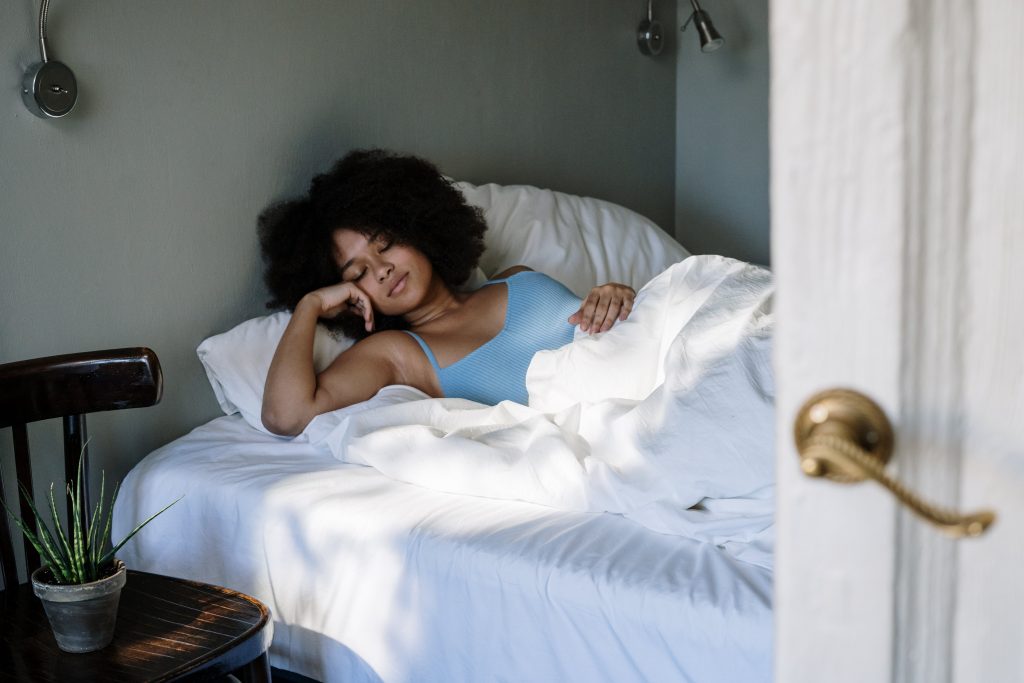While getting enough sleep is linked to improved mental health, a study found that getting enough sleep has no effect on a person’s stress-reduction techniques. Source of image: Stocksy/Studio Firma.
Long-term stress may raise the chances of anxiety and depression, two mental diseases.
A new study’s findings suggest that sleep and adaptive emotion regulation techniques play a major part in lowering the risk of anxiety and depression in those with high levels of chronic stress.
This study made use of the COVID-19 pandemic, which put a lot of people under constant stress. Regardless of the cause, managing chronic stress is essential.
Due to the unusual circumstances brought on by the COVID-19 epidemic, many people experienced prolonged periods of stress. Researchers are trying to find out what causes advances in mental health and how these long-term, ongoing pressures impact mental illness.
An investigation investigating the relationships between adaptive emotion regulation techniques, or positive coping strategies, and rates of anxiety, depression, and restless nights was published in the journal Cortex.
Both of these elements are beneficial in lowering rates of anxiety and depression, according to the authors’ study. Contrary to what they had first hypothesised, they discovered that the efficiency of emotion management techniques was independent of sleep quality.
How important is the quality of sleep?
The data on sleep and mental health that were gathered from spring to fall of 2020 during the COVID-19 pandemic were secondary analysed for this study.
Determining if adaptive emotion management techniques are linked to improved mental health was the primary goal of the research.
Long-term mental health may be enhanced by cognitive processes such as adaptive cognitive emotion management techniques. One such is the technique known as “positive reappraisal,” which involves focusing on the good things that have happened in a circumstance or event.

Secondly, they investigated the possibility that the effectiveness of adaptive emotion management techniques varied with the quality of sleep. Given that the COVID-19 pandemic is a naturally-occurring and chronic stressor, these aspects were examined.
Medical News Today received an overview of the main objectives of the enquiry from co-author Emma Sullivan:
Whether a higher frequency of positive coping techniques would be associated with a decrease in symptoms of anxiety and sadness was our first line of enquiry during the COVID-19 pandemic. Secondly, we tried to find out if the advantages of learning healthy coping strategies to lessen symptoms of anxiety and depression relied on the capacity to get a good night’s sleep. This is due to research linking healthy coping mechanisms and sound sleep to reduced symptoms of anxiety and sadness.
Techniques based on emotional intelligence are crucial.

1,600 adults participated in the study. The participants filled out online forms with vital demographic information. They also replied to surveys on coping strategies, depression, and generalised anxiety disorder.
The researchers discovered, through data analysis, that lower assessments of anxiety and sadness were linked to a greater usage of adaptive cognitive emotion management techniques.
Furthermore, a correlation was observed between the reports of better sleep and the assessments of less worry and unhappiness.
People who reported having better sleep also seemed to use more adaptable cognitive emotion control techniques, according to their research. This study examined the connection between sleep quality and adaptive cognitive emotion regulation techniques.
Using adaptive cognitive emotion regulation techniques did not substantially predict anxiety outcomes in their final model, which also took sleep quality into account.
Put differently, it seems that there is no connection between a person’s sleep quality and how well positive coping mechanisms work to lessen feelings of melancholy and anxiety. Positive regulation strategies continue to benefit mental health regardless of the calibre of sleep.
Sullivan gave MNT an explanation of the nuances of these findings:
Actually, what we discovered was that a higher frequency of using healthy coping strategies was linked to a decrease in feelings of hopelessness and anxiety. Furthermore, reduced symptoms of anxiety and depression were linked to higher-quality sleep. Contrary to our expectations, though, getting plenty of restful sleep was not necessary in order to develop healthy coping mechanisms that lessen the symptoms of anxiety and sadness.
The results are not as shocking as first thought.
The director of education at SimplePractice and licenced clinical psychologist Dr. Lindsay Oberleitner provided MNT with some context for the study’s findings. She was not engaged in the study.
She informed us that, “interestingly, in their relationship to depression and anxiety, cognitive emotion regulation techniques and sleep quality didn’t work together as was expected.”
However, she acknowledged that this may not be as shocking as it would initially appear.
This might not surprise us too much if we take a step back from the current probe. Every person’s experience of hopelessness and anxiety is known to be impacted by a wide range of intricate circumstances. Emotion management techniques go beyond basic cognitive adaption, and sleep and other physical health issues have an impact on mental health.
Research limitations and additional analysis by Lindsay Oberleitner, M.D.
However, it’s important to recognise this study’s shortcomings. Participants’ self-reporting, which is frequently unreliable, was used by the researchers.
They highlight the general lack of agreement between measures and reports of sleep quality. The researchers were unable to assess any potential changes because they were only able to examine the adaptive cognitive emotion management strategy and sleep quality once during the study.
Additionally, the authors’ dataset included more data on melancholy than anxiety. The research did not have enough power to evaluate even minor possible interaction effects.
The optimal cognitive emotion management approach or combination of strategies and sleep quality could not be examined because of the limitations of the measurements they utilised.
White American girls with higher education levels made up the majority of the study’s participants. Several factors could not be taken into account because the data was gathered online. All of these restrictions restrict the study’s conclusions to a broad interpretation and emphasise the necessity of doing more varied future research.
Finally, because the COVID-19 pandemic presented a distinct form of stress, the study’s authors note that it is challenging to generalise the study’s findings to other extended stresses and the effects they may have on mental health.
Future studies, according to Sullivan, might examine different stressors.
“Replicating these findings in the face of other long-term stressful events would be good, as the COVID-19 pandemic was obviously a unique stressful situation,” MNT heard her say.
Additionally, she continued, “it might be crucial to investigate in the future the relationships between particular mechanisms and symptoms of depression and anxiety as well as sleep quality, since we examined a variety of constructive coping mechanisms.” Two instances of this are perspective-taking, which necessitates considering the bigger picture, and positive reappraisal, which entails reevaluating the circumstance in a positive manner.


